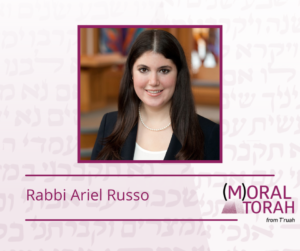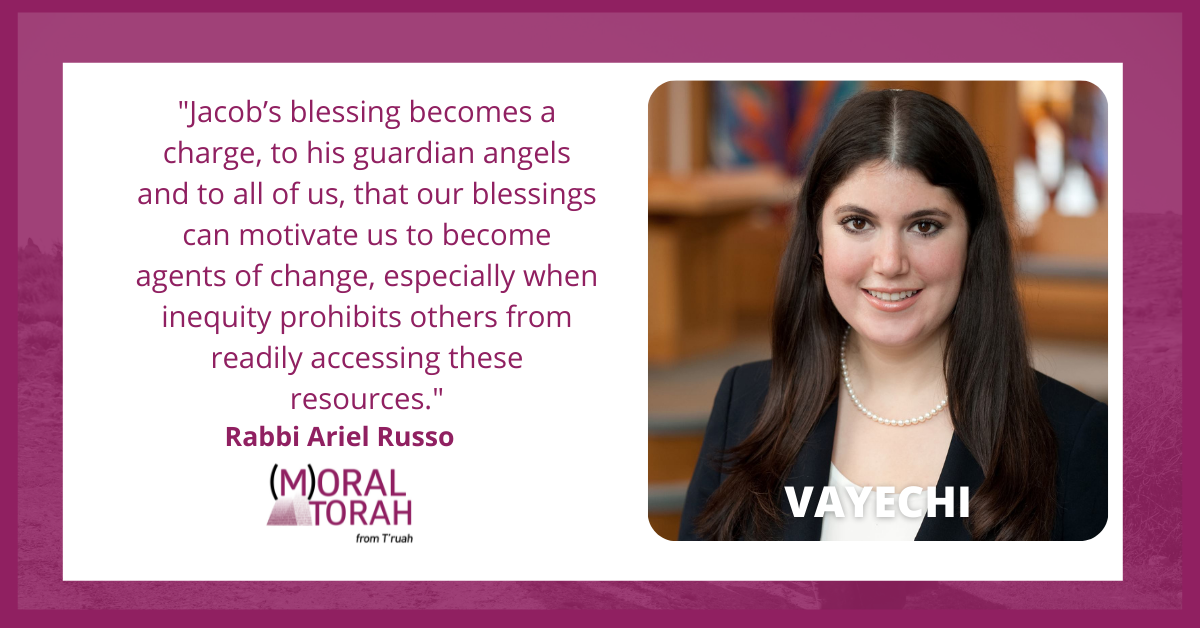A D’var Torah for Parshat Vayechi by Rabbi Ariel Russo
I’m holding my child after a long labor, witnessing the miracle of childbirth. Our skin to skin contact is euphoric and I’m relieved that everything seems healthy.
And then I barely remember what happened next. I’m told liters of blood lost, a transfusion, and oxygen, and with great fortune, a complete return to consciousness hours later. How lucky was I to be in the care of an amazing team of medical professionals, no doubt angels in my corner.
In this week’s parshah Vayechi, Jacob is on his deathbed and says, “The Angel, hamalakh who has redeemed me from all harm — Bless the lads.” (Genesis 48:16)
Sign up to receive (M)oral Torah in your inbox each week.
What a holy moment that captures what it means to be human and care for others. Jacob has had a hard life by any measure: estranged from his brother, isolated from his parents, deceived by his father-in-law, fooled by his own children who sold his favorite child into slavery, and a widower to his true love, Rachel, who died in childbirth.
And at many steps of that journey, there has been an angel by Jacob’s side, most famously the encounter he has prior to his meeting and reconciliation with his brother Esau. The French medieval commentator Rashi clarifies for us that the angel that Jacob references was usually sent to him when he found himself in most trouble.
When we go through moments of pain and persevere, we have no choice but to want our blessing to extend to others. It is one way that we can derive meaning from difficult experiences.
Like Rachel, I had harrowing births, and I feel profound gratitude that I survived. Indeed, the angel who has redeemed me from all harm, bless the lads. Though within the context of the parshah, Jacob is speaking of his offspring, the Hebrew word “ne’arim” is generic enough for me to draw its meaning beyond our specific children.
According to the non-profit Every Mother Counts, 303,000 women die around the world as a result of complications of pregnancy and childbirth, every year. In America, the number of maternal deaths is growing, with Black women dying from childbirth at a rate three to four times higher than white women.
When we experience hardship and survive, we can understand our ordeals as opportunities for change, particularly when there are unjust systems in place. For Jacob, as he recognizes on his deathbed, he wants his grandsons to be teeming multitudes, with a clear affection for Rachel’s children as an expression of his mourning. For me, as a mother who was blessed to survive childbirth, I want to help all women survive life-threatening complications and not face discrimination, access, and inequity in the maternal healthcare system.
Find more commentaries on Vayechi.
The name of this week’s parshah, Vayechi, translates to “He [Jacob] lived.” It puts the emphasis on the lives we lead, rather than the deaths we suffer. I am drawn to the connections between birth and death, the unpredictability of each and how much it matters how we are cared for in these vulnerable experiences. The 16th century Italian commentator Sforno looks at the word hamalakh, the Angel, in Jacob’s blessing and interprets the prefix hey, which usually indicates a definitive article (the angel), as not identifying a specific angel, but rather as an appeal to all of Jacob’s guardian angels. May the various angels that have been guardians for Jacob also watch over the ne’arim. Sforno understands angels as supernatural beings, but having experienced the vulnerability of needing others to intervene to save my life, I now understand this appeal to be extended to humans. We can strive to emulate angels and act as angels to repair inequity and bring goodness into our world. Surviving childbirth, and the fear of not surviving, motivates me to work towards ensuring all women survive life-threatening complications without racial discrimination. Activists, healthcare workers, philanthropists, and educators all play a role in functioning as angels to save the lives of mothers in childbirth.
 Jacob’s blessing becomes a charge, to his guardian angels and to all of us, that our blessings can motivate us to become agents of change, especially when inequity prohibits others from readily accessing these resources. May we recognize the angels in our lives and seek to bring about those blessings for everyone. May the revealing moments transform us and deepen our commitment to bring about greater equality in our world, ensuring that everyone has access to a strong maternal healthcare system.
Jacob’s blessing becomes a charge, to his guardian angels and to all of us, that our blessings can motivate us to become agents of change, especially when inequity prohibits others from readily accessing these resources. May we recognize the angels in our lives and seek to bring about those blessings for everyone. May the revealing moments transform us and deepen our commitment to bring about greater equality in our world, ensuring that everyone has access to a strong maternal healthcare system.
Rabbi Ariel Russo is the spiritual leader of CSI Nyack, where she has served since her ordination from the Jewish Theological Seminary in 2014. In her free time, she enjoys exploring the lower Hudson Valley with her husband and their three young children.

